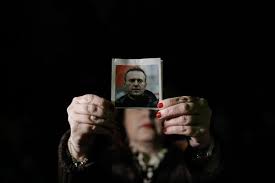Bret Stephens
President Biden said last week that he was “looking at a whole number of options” to make good on his 2021 warning to Vladimir Putin that Russia would face “devastating” consequences if Aleksei Navalny were to die in prison. Now that Putin has treated that warning with his customary contempt, Biden needs to act as a matter of moral clarity and personal credibility, and for the strategic imperative of demonstrating to a dictator that American threats aren’t hollow.
But how? Some analysts suggest that the administration, which on Tuesday vowed to impose tougher sanctions, will struggle to find ways to make them more effective, and that the best single policy to hurt Putin is to continue supporting Ukraine militarily. They’re right about the second point. As several close Russia watchers told me, however, there’s much more to be done about the first. There are four broad approaches.
Finances: “The single most important thing we can do to hit back at Putin is to enact legislation to confiscate the $300 billion of frozen Russian bank reserves for the defense and reconstruction of Ukraine,” Bill Browder, investor and political activist, wrote me on Monday. Browder is best known as the moving force behind the Magnitsky Acts, which put sanctions on Russian officials implicated in corruption and other abuses. Browder’s suggestion isn’t new. And it’s been resisted by US government officials who fear that it exceeds what American law allows and would encourage a flight from dollar assets. But as the Harvard legal scholar Larry Tribe and a team of experts from the firm of Kaplan, Heckler & Fink noted last year in a report for the Renew Democracy Initiative, seizing Russia’s assets is explicitly allowed as a “countermeasure,” an act designed to compel an aggressor to come into compliance with international law. As for the flight-from-the-dollar argument, it might otherwise be persuasive if the need to save Ukraine and punish Russia weren’t more urgent.
Seizing Russia’s assets “would be like two fingers in the eyes from the West,” Browder added. “Putin doesn’t care how many soldiers are killed, but he cares profoundly about his money. To top it off, all countries should call this new legislation the Navalny Act.” Recognition: “Do not recognize Putin as the president of Russia after March 17 – that simple,” Garry Kasparov, the legendary chess and human-rights champion, told me by phone from Berlin. “Do not recognize the regime as legitimate.”
Kasparov was alluding to next month’s sham presidential election, in which Putin is running for a fifth term. But he’s also nodding to a deeper point, which is that while Putin might be indifferent to questions of legality, he craves and is keenly attuned to the trappings of political legitimacy, particularly internationally, which bolster his claims to rule. It’s a point that was underscored to me by the economist Konstantin Sonin, a professor at the University of Chicago who this month was arrested in absentia by a Russian court. “Putin and his henchmen should be recognized and treated as a gang whose hold on power in Russia is based on brute force rather than any kind of legitimacy,” Sonin said. “It does not make sense to negotiate with Putin as any kind of agreement will have to be renegotiated when his regime falls.”
Dissidents: When Natan Sharansky called me from Jerusalem, that great Soviet refusenik, who exchanged letters with Navalny last year, turned almost immediately to Vladimir Kara-Murza, another imprisoned dissident. Like Navalny, Kara-Murza, 42, also survived poisonings and comas.
Like Navalny, he’s being held in a “strict regime” penal colony on a 25-year-sentence for his opposition to Putin. “If there are no changes” to Western policy, Sharansky said, Putin “could kill Kara-Murza tomorrow. The West needs to understand that these dissidents are the real friends of the free world, and they have to be seen as candidates for prisoner exchanges.” Sharansky was particularly critical of the 2022 exchange of a Russian archfiend, Viktor Bout, for the basketball star Brittney Griner, which surely enticed the Kremlin to arrest Evan Gershkovich, the Wall Street Journal reporter, last March. “America showed they are a bad bargainer,” Sharansky lamented.
Sharansky is seconded by Reuel Marc Gerecht, a former C.I.A. case officer and senior fellow at the Foundation for Defense of Democracies. “The great Soviet dissidents taught us that they were fortified by Western attention to their plight,” Gerecht told me. “Today, we don’t know what Russian dissident, what Russian on the cusp of going ‘rogue,’ might galvanize Russians who loathe the regime.” Power: One of my sources for this column asked not to be named because of the sensitivity of his current position, but he’s a long-admired expert on energy markets. “America’s liquefied natural gas is now part of NATO’s arsenal against Russia,” he told me. Biden, he advised, could “restore US credibility as an L.N.G. exporter by lifting the administration’s ‘pause’ on new L.N.G. permits and thereby give Europe and Japan confidence to stop importing Russian L.N.G.”
While Russia’s oil and gas revenues have fallen steeply since the Ukraine war began, they still came to close to $100 billion last year – enough to finance the Kremlin’s war machine. What else could hurt? David Petraeus, the retired general and former C.I.A. director, had a specific suggestion: “The White House should announce the provision of the Army Tactical Missile System to Ukraine, which would double the range to approximately 300 kilometers of the missiles provided by the US to date.” Along with everyone I spoke with, Petraeus recognized that those missiles could be provided only if the $60 billion in military aid to Ukraine that the Senate approved last week can overcome a wall of Republican opposition in the House. Every Republican with a memory of what their party once stood for has an obligation to vote for that bill, just as Biden has a duty to ensure that evil will not go unpunished, and that Navalny did not die for nothing.
The New York Times







